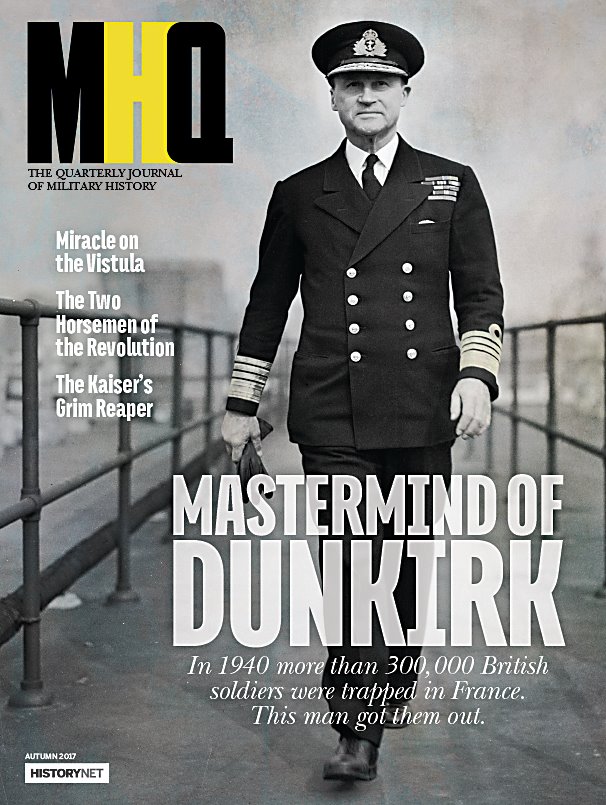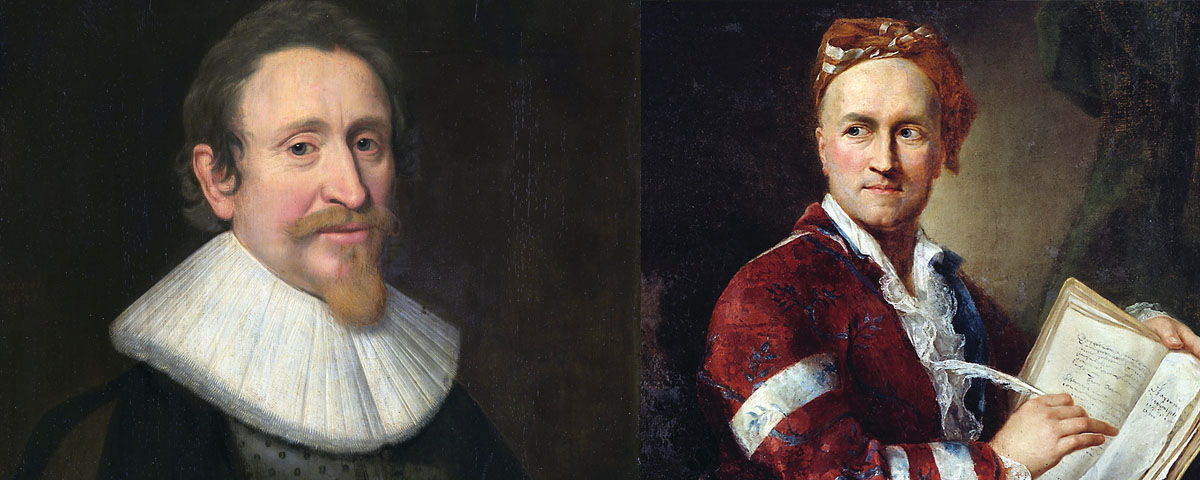Hugo Grotius and Emmerich de Vattel laid the intellectual groundwork for the modern concept of lawful warfare.
The idea that warfare should be regulated or restrained by a code of conduct of some kind is sometimes assumed to be fairly modern, but for thousands of years commentators have offered arguments for certain standards of behavior on the battlefield. What is relatively new is the creation of formal codifications of law that not only seek to impose standards of acceptable conduct on soldiers but also define what types of actions violate those standards.
The Dutch jurist Hugo Grotius is widely regarded as the intellectual father of modern laws of war. Grotius lived in the time of the Eighty Years’ War in the Spanish Netherlands and the Thirty Years’ War that ravaged Germany—wars of religion and politics that laid waste to northern Europe and killed as much as a third of the civilian populations of the affected countries. The scale of human suffering caused by such unrestrained warfare convinced Grotius that moderation was desperately needed in the conduct of war. “Throughout the Christian world I observed a lack of restraint in relation to war,” he wrote. “I observed that men rush to arms for slight causes, or no cause at all, and that when arms have once been taken up there is no longer any respect for law, divine or human.”
Grotius published De Jure Belli ac Pacis, or On the Law of War and Peace, in 1625. He based his treatise on a belief in the “rational intelligence” of man, which provided the foundation for his arguments of universal laws. In constructing his theory of lawful warfare, he first set out to define the concept of a just war and then presented his argument that universal laws, timeless and perpetual, “continue even during strife and constitute the laws of war….To disavow the imperative character of these perpetual laws is to revert to barbarism.”
In support of his theories, Grotius marshaled the full weight of classical authorities—names that were instantly familiar to every well-educated 17th-century European reader. Homer, Cicero, Plato, Xenophon, Augustin, Tacitus, Polybius, Plutarch, and others—Grotius quoted them all with an enthusiastic frequency that has occasionally led modern commentators to criticize him for indulging in a bit of intellectual name-dropping. There was more to it than that, however; Grotius was reaching back into hallowed antiquity to demonstrate that his concepts of universal law were supported by millennia of human understanding.
De Jure Belli ac Pacis had an almost immediate impact on Europe’s intellectual landscape. Within a decade of its publication, the governments of Denmark, England, Poland, Spain, and Sweden had all offered Grotius positions of importance in their service. He eventually accepted the Swedish offer. Sweden’s great soldier-king, Gustavus Adolphus, had been an ardent student of Grotius’s theories on lawful warfare, famously keeping a Bible and a copy of De Jure Belli with him on campaign before the Battle of Lützen, where he was killed in 1632.
The savagery and horrific death toll of the Thirty Years’ War, in particular, influenced Grotius in his work on the ideas of justified conflict and lawful conduct of war. He was driven by “the love of peace,” but he was in no way a pacifist. Rather than seeking to eliminate warfare, Grotius sought to define what was lawful war and what was not; what was acceptable in fighting a war and what was a violation of universal or natural law. Grotius was a progressive thinker, but he was also a realist. “Killing an enemy is indeed everywhere called a right of war,” he wrote, and he accepted that as part of natural law. But having accepted that reality, he went on to argue that “forbearance in war is not only a tribute to justice, it is a tribute to humanity, it is a tribute to moderation, it is a tribute to greatness of soul.”
De Jure Belli’s contribution to the development and maturation of modern laws of war is undeniable, but as one scholar points out, it was only the “book of Genesis” in the canon of lawful warfare doctrine. In laying the foundation for his theory of lawful warfare, Grotius spent more time arguing for the recognition of the concepts of just and unjust warfare than he did actually suggesting specific rules for belligerent conduct. It fell to other scholars in following centuries to build a system of codified laws onto the framework provided by De Jure Belli. Grotius had many disciples, but perhaps none was more deserving of his mantle than Emmerich de Vattel, the German-Swiss philosopher and jurist.
Vattel, whose first name also appears as Emer, published his most significant work, Le Droit des Gens, or The Law of Nations, in 1758. Just as Grotius had grappled with articulating the concepts of lawful warfare, Vattel also engaged with the broad issues of international diplomacy and states in conflict, formulating his famous “Golden Rule of Sovereigns” when he wrote, “One cannot complain when he is treated as he treats others.” The idea of just war was also a central tenet of Vattel’s treatise. “War cannot be just on both sides,” he argued. “One party claims a right; the other disputes it—the one complains of an injury; the other denies having done it. It is impossible that two contrary sentiments should be true at the same time.”
Where Vattel surpassed Grotius was in the detail with which he considered specific acts that belligerent nations and their soldiers would commit in war, and in The Law of Nations we find many of the arguments for restraint of military actions that are part of lawful-war doctrine today. The presence of noncombatants was an inevitable part of Western European warfare; “Women, children, feeble old men, and sick persons come under the description of enemies, and we have certain rights over them, inasmuch as they belong to the nation with whom we are at war,” Vattel argued. “But these are enemies who make no resistance, and consequently we have no right to maltreat their persons or use any violence against them, much less to take away their lives.” The Law of Nations also tackled the issue of how prisoners of war should be treated. “As soon as your enemy has laid down his arms and surrendered his person,” Vattel wrote, “you have no longer any right over his life, unless he should give you such right by some new attempt.”
Vattel, like Grotius, did not seek to eliminate war, since his doctrine of just war allowed that war might be necessary in some circumstances. But he was concerned with how war might be brought to an end with the least destruction and loss of life, and so he argued against any actions that would lead to a perpetual cycle of retaliation. Wars, Vattel believed, should be fought as effectively as possible to achieve victory with the least amount of suffering. “All damage done to the enemy unnecessarily, every act of hostility which does not tend to procure victory and bring the war to a conclusion,” he wrote, “is a licentiousness condemned by the law of nature.”
The degree to which De Jure Belli and The Law of Nations have influenced modern concept of lawful warfare is demonstrated by the fact that in the 2015 edition of the Law of War Manual published by the U.S. Department of Defense, four men are named as foundational authorities on the laws of war, with Grotius listed first and Vattel second.
Vattel’s work was also highly regarded by George Washington, who in 1789 borrowed a copy of The Law of Nations from the New York Society Library and never returned it. Two hundred years later the case of the unreturned book came to the attention of the staff at the museum at Mount Vernon. By then the original borrowed copy of the book was missing, so a replacement copy of the same edition was purchased for $12,000. When the book was returned to the New York Society Library in May 2010, it was 221 years overdue. The library graciously waived the considerable late fees. MHQ
JOHN A. HAYMOND is the author of The Infamous Dakota War Trials of 1862: Revenge, Military Law, and the Judgment of History (McFarland & Company, 2016).
[hr]
This article appears in the Autumn 2017 issue (Vol. 30, No. 1) of MHQ—The Quarterly Journal of Military History with the headline: Founding Fathers
Want to have the lavishly illustrated, premium-quality print edition of MHQ delivered directly to you four times a year? Subscribe now at special savings!


